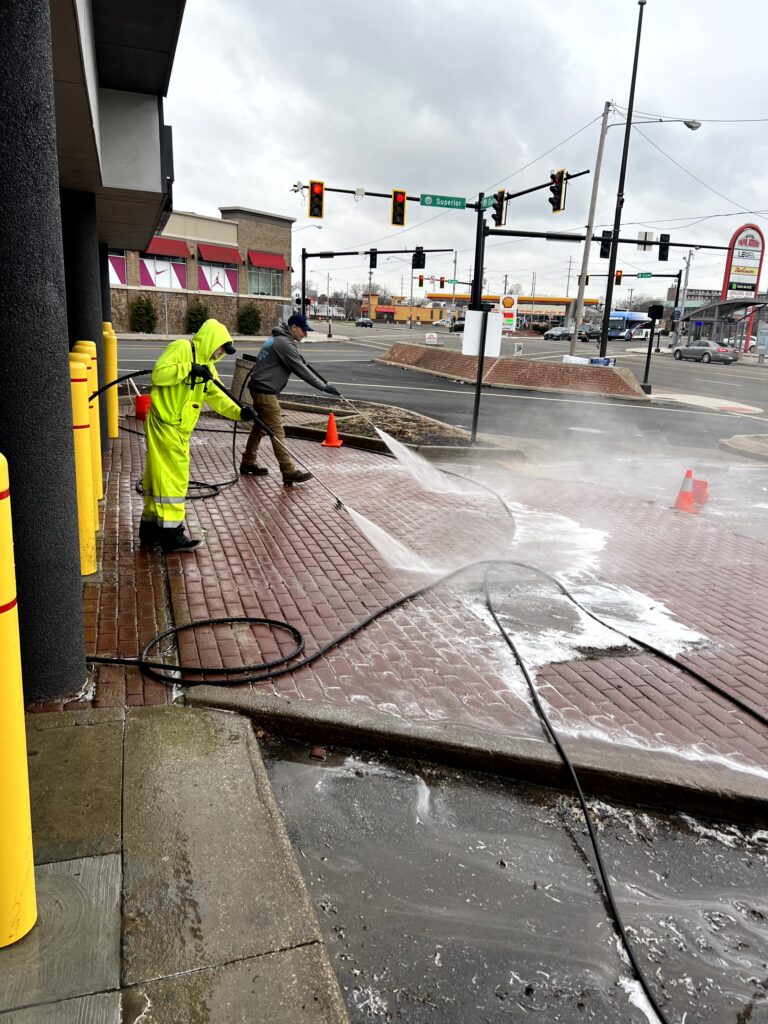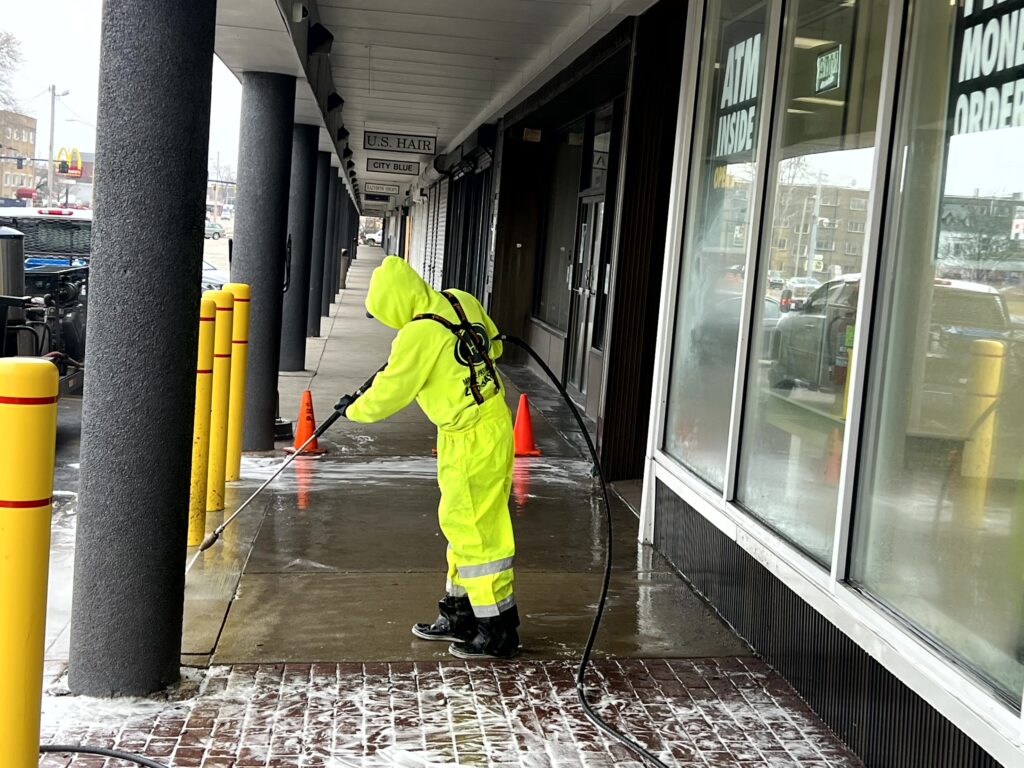
Maintaining a clean, attractive storefront is a fundamental yet often overlooked aspect of business management. For brick-and-mortar businesses, the storefront is more than just a physical space; it is an extension of the brand and a powerful visual tool for attracting customers. Pressure washing, when done properly and regularly, can remove the accumulated dirt, grime, mold, and pollutants that build up over time, revitalizing a storefront’s appearance and protecting it from structural damage. This guide explores the multitude of benefits that storefront pressure washing offers, including aesthetic improvements, structural preservation, safety enhancements, and environmental compliance. Additionally, we’ll explore advice from leading equipment manufacturers on best practices, cleaning techniques, and environmentally responsible choices for effective pressure washing.
1. Enhancing Aesthetic Appeal and Brand Image
A clean and polished storefront creates an immediate positive impression on passersby, potentially converting them into customers. Storefront pressure washing can dramatically improve curb appeal by removing stains, dirt, and other contaminants, resulting in a well-kept, inviting appearance that reflects positively on the business.
Key Points:
- Visual Impact on Customer Perceptions: A recent study on consumer behavior indicated that 52% of shoppers avoid businesses with visibly dirty or poorly maintained exteriors. First impressions matter significantly in the retail industry, and a spotless storefront can help attract new customers and increase foot traffic.
- Reinforcing Brand Image: For companies that emphasize quality, cleanliness, and customer care, a consistently clean storefront helps reinforce those brand values, making it clear to customers that the business prioritizes excellence at every level.
Manufacturer Recommendation:
Leading pressure washing brands, such as Kärcher, advise that business owners use a combination of gentle cleansers and low-pressure settings for storefronts. Kärcher recommends a monthly rinse for businesses with high foot traffic, and a quarterly thorough pressure washing in less busy areas. They also suggest using wide-angle spray nozzles, which cover more surface area and help avoid streaking. [1]

2. Preserving Structural Integrity and Reducing Maintenance Costs
Dirt, mildew, mold, and grime accumulation are more than just superficial problems. These contaminants can wear down building materials over time, causing serious structural issues that are both costly and time-consuming to repair. Routine pressure washing acts as a preventative maintenance measure, extending the lifespan of building materials and protecting the investment in the property itself.
Key Points:
- Preventing Damage from Mold and Mildew: Mold spores thrive in moisture, and once they start growing on a building’s exterior, they can cause erosion and even structural damage. Certain types of mold are also hazardous to health and can degrade building materials if left untreated.
- Saving on Repairs: Pressure washing removes harmful contaminants before they have a chance to penetrate deeper layers of materials, saving money on costly repairs and even more expensive restoration projects.
Manufacturer Recommendation:
Simpson Cleaning emphasizes the importance of using surface cleaners for porous materials like concrete and brick. They recommend an annual deep cleaning, especially in climates with high humidity or heavy rainfall, which can accelerate the growth of mold and mildew. For buildings in dry climates, Simpson suggests bi-annual washing using low-impact, biodegradable cleaning agents to protect the structure while eliminating dirt buildup. [2]
3. Enhancing Health and Safety Standards
Storefront cleanliness is directly linked to health and safety, both for customers and employees. Grimy walkways can pose slip-and-fall risks, while mold growth can affect air quality and lead to respiratory issues.
Key Points:
- Reducing Slip Hazards: Wet or moss-covered surfaces are slippery and present a hazard for anyone walking on them. Regular pressure washing reduces this risk, keeping pathways, sidewalks, and entryways clean and safe.
- Improving Air Quality: Mold, mildew, and pollen on building exteriors can negatively affect the air quality around the property. Regularly cleaning these contaminants can make the outdoor environment safer, especially for individuals with allergies or respiratory conditions.
Manufacturer Recommendation:
DEWALT suggests that business owners use high-pressure systems cautiously around walkways to avoid damage to concrete surfaces. They advise pairing pressure washers with cleaning solutions specifically designed to break down algae and moss. DEWALT also recommends outfitting pressure washers with adjustable PSI settings, allowing businesses to tailor the water pressure to the cleaning task. [3]
4. Increasing Property Value and Long-Term Investment Protection
A clean, well-maintained storefront not only looks appealing but also enhances the overall property value. Consistent pressure washing preserves the building’s appearance and condition, which can result in a higher valuation when it’s time to sell or lease the property.
Key Points:
- Boosting Curb Appeal for Tenants and Buyers: Real estate professionals note that well-maintained commercial properties have an edge in the market. A clean storefront appeals to potential buyers and tenants, especially for high-end retail and office spaces.
- Preventative Maintenance as Cost-Saving Measure: By extending the life of the building materials through routine pressure washing, business owners can avoid the hefty costs of extensive repairs or renovations.
Manufacturer Recommendation:
RYOBI recommends that property owners looking to increase value invest in pressure washers that offer dual settings for light and heavy-duty jobs. RYOBI also suggests using biodegradable, eco-friendly detergents that are safe for exterior plants and landscaping, allowing for a thorough cleaning without risk of harm to greenery. They advocate for property owners to schedule semi-annual cleanings to maintain peak curb appeal and maximize value. [4]

5. Meeting Environmental Standards and Local Compliance
In addition to the direct benefits, storefront pressure washing also offers environmental advantages, especially when performed with eco-conscious practices in mind. Many jurisdictions require commercial properties to meet specific cleanliness and environmental standards, particularly those located near public spaces or in food-related industries.
Key Points:
- Environmentally Friendly Cleaning Solutions: Many pressure washing detergents are now formulated to be biodegradable, ensuring they do not negatively impact the surrounding ecosystem. Businesses can comply with environmental regulations by using eco-friendly products and practices.
- Reducing Pollutants: Pollutants, such as oil, dirt, and mold, washed away from buildings often end up in stormwater drains, contributing to urban water pollution. By using specialized equipment and environmentally safe products, businesses help mitigate their environmental footprint.
Manufacturer Recommendation:
Greenworks Commercial promotes the use of electric pressure washers as a sustainable option, particularly for businesses with a commitment to reducing their carbon footprint. They advise pairing electric washers with eco-friendly soaps and cleaners to meet compliance with local environmental laws. Greenworks also highlights the importance of water recovery systems, which capture runoff and prevent contaminants from entering storm drains. [5]
6. Practical Tips for Implementing a Storefront Pressure Washing Program
Implementing a structured pressure washing routine requires thoughtful planning. From equipment selection to choosing the right detergents, here are a few essential considerations for business owners:
- Frequency of Cleaning: High-traffic storefronts should be pressure washed more frequently, generally every one to three months. Low-traffic areas may only need cleaning biannually. Weather and climate also play a role; storefronts in areas with heavy rainfall or pollution may require additional cleanings.
- Choosing Between DIY and Professional Services: Small storefronts with minimal buildup can often be handled with consumer-grade pressure washers. For large properties or heavily stained surfaces, professional pressure washing services with commercial-grade equipment are recommended.
- Selecting the Right Equipment and Nozzles: The nozzle type and PSI setting are crucial in pressure washing. For delicate surfaces, manufacturers recommend using a 25- or 40-degree nozzle to avoid damaging paint and other sensitive materials.
Conclusion
Storefront pressure washing is a vital component of a successful property maintenance strategy. By maintaining a clean, visually appealing storefront, businesses can improve customer experience, protect their property investment, ensure compliance with health and environmental standards, and even increase the property’s long-term value. Business owners who prioritize regular pressure washing not only benefit from a more inviting appearance but also contribute positively to their local environment.
Through a combination of best practices, eco-friendly cleaning solutions, and manufacturer-recommended techniques, businesses can make pressure washing an effective, sustainable part of their routine property care. Whether handled by professionals or performed in-house, this proactive approach to storefront maintenance yields numerous dividends, from enhanced customer appeal to long-term savings on repairs and renovations. In today’s highly competitive marketplace, such investments in property care reflect well on the business itself, demonstrating a commitment to quality and attention to detail that resonates with customers.
References
- Kärcher – Professional Pressure Washing Solutions and Recommendations. [Accessed 2023]
- Greenworks Commercial – Eco-Friendly Cleaning Agents for Pressure Washing. [Accessed 2023]
- DEWALT – Best Practices for Safe and Effective Pressure Washing. [Accessed 2023]
- Simpson Cleaning – Optimizing Pressure Washing for Commercial Properties. [Accessed 2023]
- RYOBI – Environmental Considerations and Equipment for Commercial Cleaning. [Accessed 2023]
